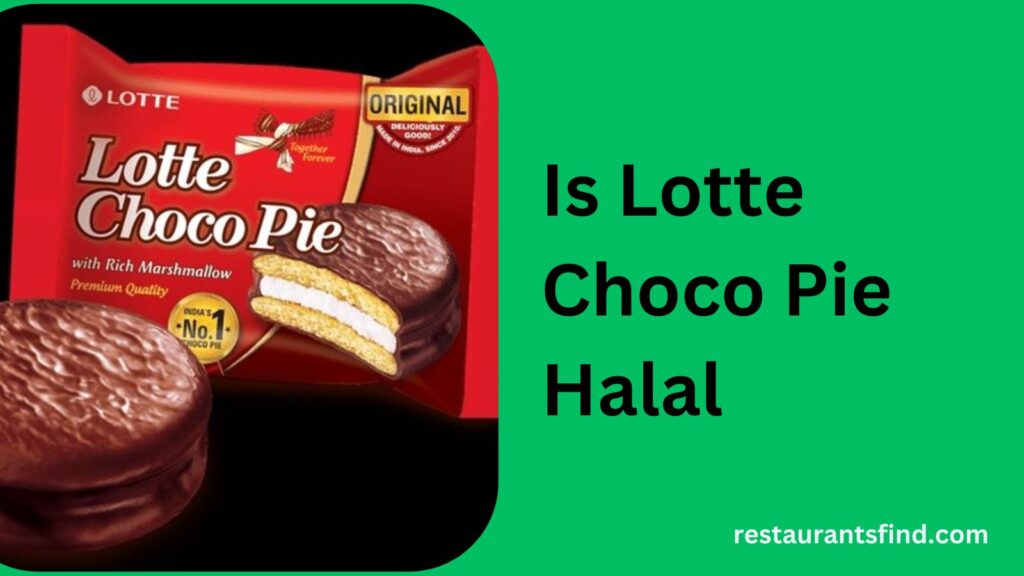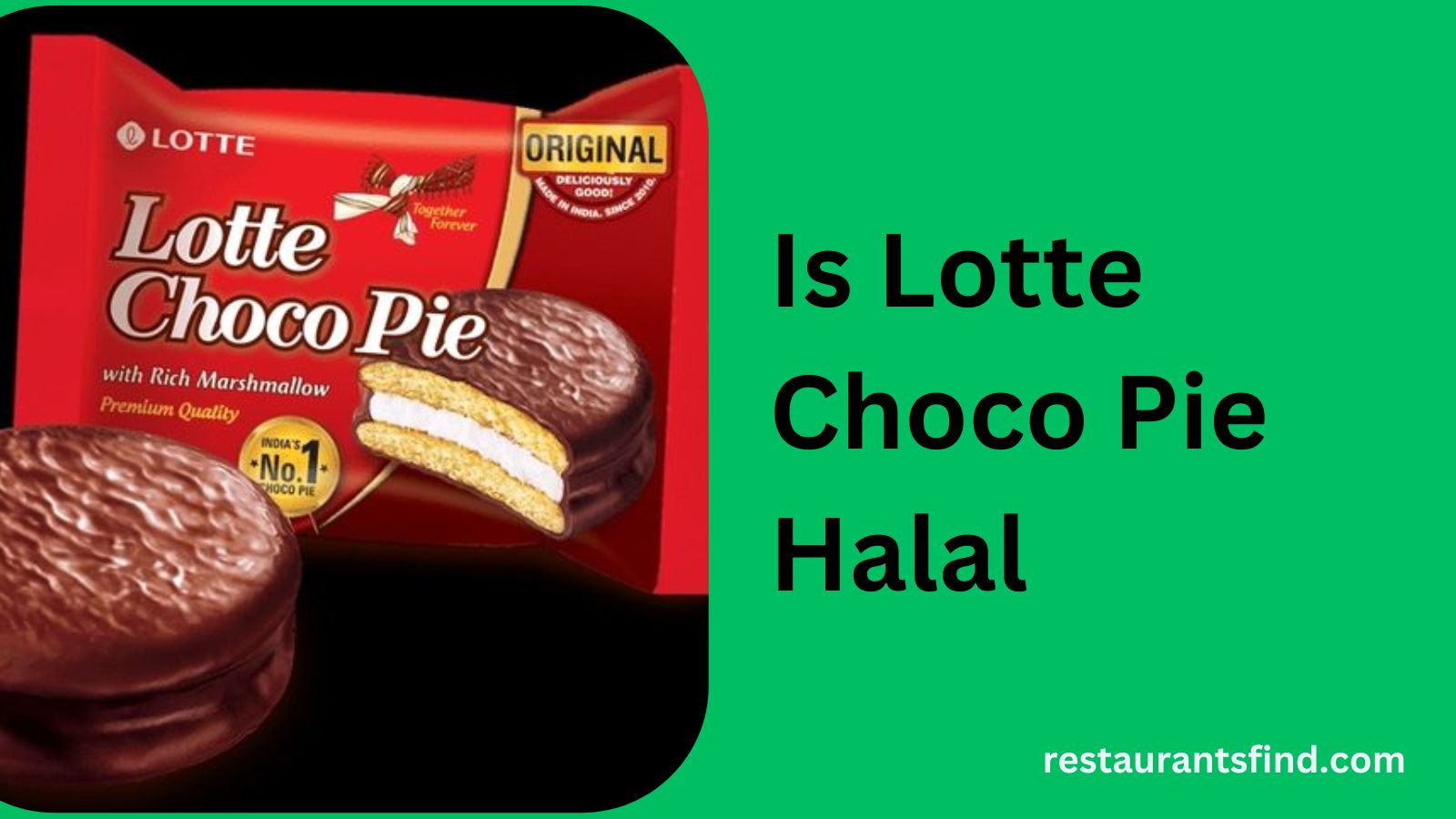Lotte Choco Pie has become a beloved snack across the globe, from children enjoying it in lunch boxes to adults savoring its marshmallow-filled goodness during a quick snack break. However, for many Muslim consumers, the question lingers—is Lotte Choco Pie halal? With growing demand for halal-certified products, especially in regions like the Middle East and Southeast Asia, it’s essential to know whether this popular treat aligns with halal dietary guidelines.

Breaking Down the Ingredients of Lotte Choco Pie
Let’s take a closer look at the key ingredients found in Lotte Choco Pie to understand where it is halal or not. Here’s a breakdown of the common ingredients typically listed on the packaging:
- Wheat Flour: A primary ingredient in the cake layer of Lotte Choco Pie. It’s a staple in most baked goods and is naturally halal unless cross-contaminated with non-halal substances during processing.
- Sugar: Used as a sweetener, sugar is generally considered halal. However, some concerns arise when sugar is processed using bone char (often derived from non-halal animal bones), but this is not typically an issue with most major food brands today.
- Eggs: Eggs are used to give the cake a soft and fluffy texture. While eggs are halal, the source of the eggs (factory farming conditions) might raise questions for some consumers, though they are still considered halal in Islamic dietary laws.
- Vegetable Oil: A common ingredient in baked goods to provide moisture. Vegetable oils, such as palm or soybean oil, are naturally halal.
- Milk Solids: Milk solids are derived from milk and are used to enhance the texture and flavor. As long as the milk comes from halal sources (non-pork animals), milk solids are considered halal.
- Cocoa Powder: Used to give the cake its chocolate flavor. Cocoa itself is a plant-based product and is naturally halal.
- Gelatin: This ingredient raises the most questions. Gelatin is used in the marshmallow filling to give it its signature soft texture. However, gelatin can be derived from either pork or beef. If the gelatin is from pork, it’s haram (forbidden), but if it’s from halal-slaughtered beef or plant-based sources, it’s permissible. The confusion arises because some websites claim that the gelatin used in Lotte Choco Pie is derived from non-halal animal sources.
- Emulsifiers (E471): This ingredient helps maintain texture by keeping the water and oil from separating. Emulsifiers like E471 can be sourced from either plant or animal fats, which creates some concern. If the source is animal-based, it needs to be from a halal source, which is often hard to verify without clear labeling.
- Leavening Agents: These help the cake rise and become fluffy. Most leavening agents are plant-based or synthetic, and are generally considered halal.
- Flavorings: Often used to enhance the taste of the product. Flavorings can sometimes contain alcohol or other non-halal substances, but in halal-certified products, flavorings must comply with halal standards.
The Halal Certification: What Does the Lotte Choco Pie Official Say?
The good news is that Lotte Choco Pie has obtained halal certification, as confirmed on their official website and Facebook page.

In fact, they’ve gone as far as to share a picture of their halal certification, offering transparency to consumers seeking reassurance. This certification implies that the product meets the strict requirements of halal dietary laws, from ingredient sourcing to manufacturing processes.
Halal certification typically involves a detailed inspection to ensure that no non-halal substances, such as pork-derived gelatin or alcohol, are included. However, despite this official certification, some confusion still exists around the product’s ingredients.
Why the Controversy?
Despite the halal certification, some consumers are still wary. Many online sources continue to claim that Lotte Choco Pie contains gelatin from non-halal sources. This could be due to regional variations in the product’s recipe, as ingredients can differ depending on where the snack is manufactured and sold. Therefore, it’s crucial for consumers to check their local product packaging to confirm that the specific version they are purchasing is certified halal.
In some cases, recipes for internationally distributed products can change due to local ingredient availability or market demands. A product may be halal-certified in one country but not in another, leading to confusion among consumers.
Halal Alternatives to Lotte Choco Pie
If you’re still uncertain about Lotte Choco Pie or can’t find a halal-certified version in your area, there are plenty of similar snacks that are explicitly halal-certified:
- Halal Haribo Marshmallow: For a marshmallow-based snack that’s widely recognized as halal, Haribo’s halal range offers a sweet treat for everyone.
- Halal-certified brownies or cakes: Many bakeries now offer delicious alternatives to satisfy your chocolate cravings while remaining within halal guidelines.
Conclusion
So, is Lotte Choco Pie halal? Yes, according to their official website and Facebook page, the product is halal-certified, which should ease the concerns of most consumers. However, given the confusion around ingredients like gelatin, it’s important to remain vigilant and check for the certification on your local packaging. This certification ensures the product meets the highest halal standards, from the ingredients to the manufacturing process.
At the end of the day, trusting halal certifications and keeping informed about the ingredients in your food is key to maintaining dietary integrity. If you’re still unsure, there are many halal-friendly alternatives available on the market to satisfy your sweet tooth.


1 thought on “Is Lotte Choco Pie Halal? Everything You Need to Know”